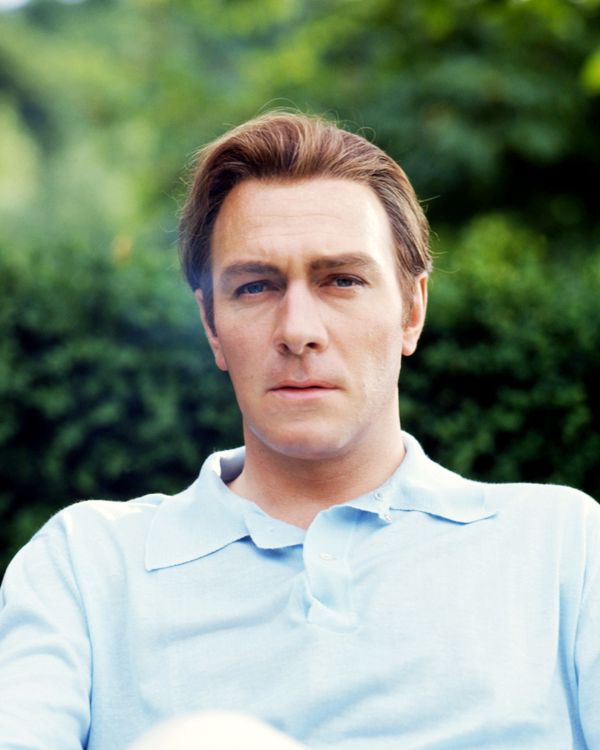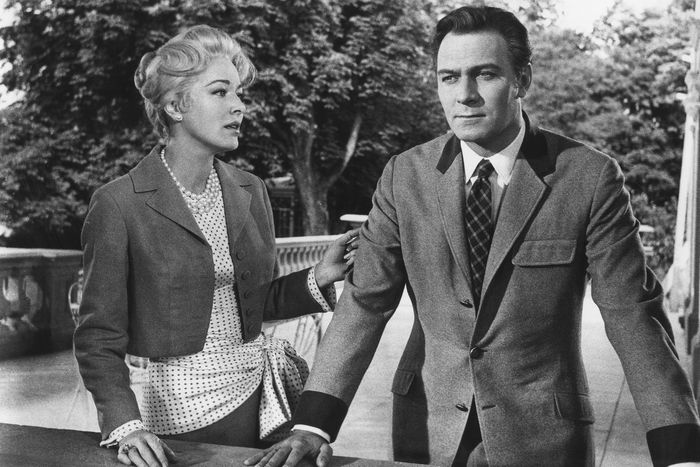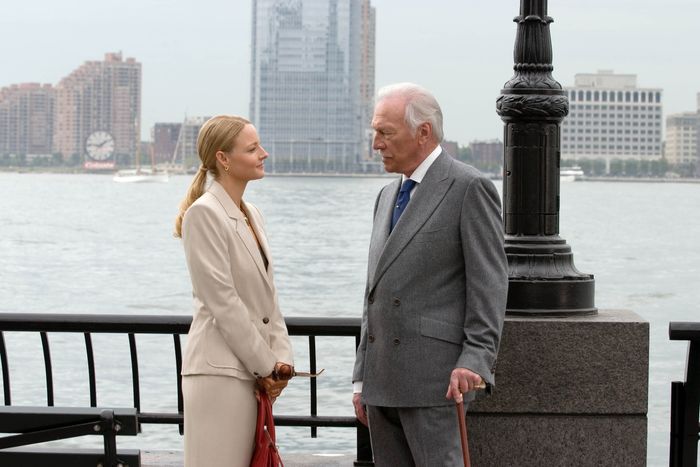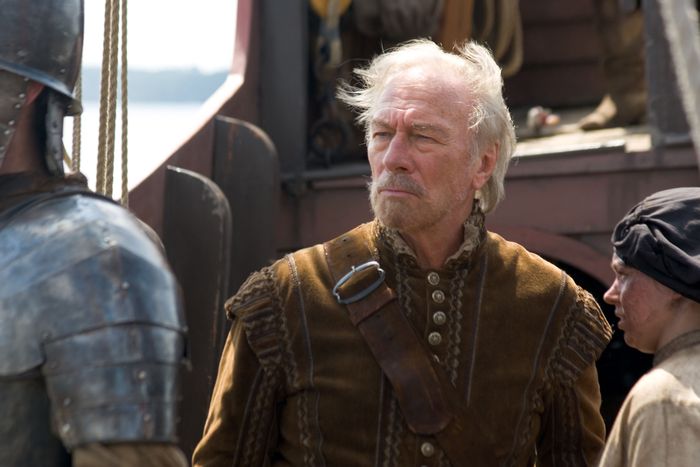
You could never do better than Christopher Plummer. A workhorse character actor with matinee-idol looks, he moved from genre to genre and decade to decade with grace, intelligence, and an aversion to fuss, winning an Oscar, two Tonys, two Emmys, and countless other honors. Even though he was 91, his death came as a shock. Plummer looked and acted hale enough to thrive for another ten or 15 or who knows how many years, working all the way to the final curtain.
He wasn’t just a pro. If there were a fabulous comic-book A-team of character actors — an Expendables, a Wild Bunch, an Avengers Initiative — Christopher Plummer would have been the one you put in charge of it, the Reed Richards or Morpheus of the crew. And he would probably have designed and built the headquarters but wouldn’t have told you he did any of it: He would have just let you find out on your own, by doing your homework, because that’s how he always figured things out — and what better legacy?
It was Plummer to whom Ridley Scott turned as a replacement for Kevin Spacey in the role of twisted billionaire John Paul Getty in the 2017 kidnap drama All the Money in the World, with mere weeks to go until the film’s scheduled release, after Spacey had to be recast amid sexual-assault allegations. Plummer nailed it. He played Getty so brilliantly he not only eliminated any possibility of imagining another person in the part, he got a Best Supporting Actor Oscar nomination (arguably not just for the quality of his performance but for the awesome display of craft and reliability involved in his stepping in). He had been nominated twice before, for playing a man coming out of the closet in his 70s in 2010’s touching father-son drama Beginners and for 2009’s The Last Station, in which he played Leo Tolstoy during the final months of his life. He won for Beginners, setting a record as the oldest performer to receive the award in that category. (He then broke his own record with All the Money in the World, becoming the oldest performer nominated in that category; he was 88 at the time.)
The list of memorable films Plummer appeared in would embarrass actors who are more often described as stars — a word that never applied to him because, despite his smashing looks, his career never acquired that industry luster, maybe because he gave off no-nonsense vibes that quashed anyone who was inclined to mystify or glamorize what he did. The Sound of Music. Inside Man. Up. The Silent Partner. Curse of the Pink Panther. 12 Monkeys. A Beautiful Mind. The New World. Syriana. He was Aristotle in Alexander and Van Helsing in Dracula 2000 and Mike Wallace in The Insider, and he never coasted on a stentorian voice or a grandiose manner or any particular set of well-established tricks. He built a performance like a table in a woodshop, shaping and smoothing each piece and thinking about how it would fit together with every other and what kind of room the finished product was supposed to exist in.
Plummer was polite and receptive to notes and was not averse to praise, but he could be exacting and prickly and he suffered fools only up to a point. I got a taste of this firsthand about 20 years ago at an awards-season party where I was trying to drum up support for Michael Mann’s 1999 film The Insider, a brilliantly realized docudrama about corporate and media corruption that tanked at the box office but has held up beautifully. I was trying to get quotes from Plummer for a New Jersey Star-Ledger column I was writing about TV news at the time, but I had to wait until another journalist had finished talking to him. That writer’s praise was incessant and effusive, and while Plummer accepted it graciously, wincing only a bit, there came a point when he couldn’t take it any longer, and it arrived when the writer told him his performance as Mike Wallace was so convincing that “I forgot I wasn’t watching the real Mike Wallace.” “Oh, come on now,” Plummer said, laughing. “That’s ridiculous, don’t you think?”
He later told me, “I didn’t mean to be confrontational, but did I seem like I was doing an impression to you?” He went on to explain that he was playing an idea of Wallace based on his and the director’s and the screenwriters’ understanding of the character’s function in the story. The focus was on Wallace’s professional pride and integrity. (In the view of the film, these had run aground on the shoals of self-interest once CBS caved to pressure from the Brown & Williamson tobacco company to spike a report on its adding addictive chemicals to cigarettes; the network feared the report would ruin its parent company’s plans to merge with the tobacco giant.) Plummer explained that if he had just tried to look and sound like Wallace, the effect would have pulled the focus from the true heart of the movie, “because people would be comparing me to the real Mike Wallace and judging the accuracy of the impersonation. And what would have been the point of that? People can turn on the TV every Sunday night and see the real Mike Wallace.”
Plummer could be self-castigating. He never liked his performance in 1965’s The Sound of Music, beloved as it was and despite how many young viewers watched him as the tall, gorgeous, tuneful Captain Georg von Trapp and experienced what felt in retrospect like the onset of puberty. (But he did have praise for the movie itself, particularly the work of his co-star, Julie Andrews; he said working with her “was like getting hit on the head with a valentine.”) And Plummer could be publicly critical of filmmakers he’d worked with. That’s considered taboo in the industry, but he quit worrying about where the next job was coming from once he had reached a certain age and had a dozen or more classics to his name; he refused to hold his tongue if he felt somebody else in a production wasn’t holding up their end of things. Eight years ago, he said during a Newsweek acting roundtable that he would never work with The New World director Terrence Malick again because “he needs a writer, desperately. He insists on overwriting until it sounds terribly pretentious … and he edits his films in such a way that he cuts everyone out of them.” Plummer wasn’t telling tales out of school, either. He said the same things to Malick in a letter: “I gave him shit. I’ll never work with him again.”
Plummer was born in Toronto and raised in Senneville, Quebec. He made his Broadway debut in 1954 and jumped to films a few years later, switching regularly between stage and screen throughout his career. On Broadway, he was Cyrano de Bergerac, King Lear, John Barrymore, and Clarence Darrow (renamed Henry Drummond in a 2007 revival of Inherit the Wind). His chiseled looks and lean, tall frame made him a natural for authoritative roles in dramas pulled from history. He was Arthur Wellesley, the first Duke of Wellington, in Waterloo (1970), Rudyard Kipling in The Man Who Would Be King (1975), Kaiser Wilhelm II in The Exception (2016), and the Roman emperor Commodus in The Fall of the Roman Empire (1964).
But he could also be dashing and dangerously sexy, magnetic in a slightly unsettling way. Look at his performance as Arthur Case, a bank founder who is afraid the contents of a vault will be discovered by a robber in Spike Lee’s Inside Man. Even though the shape of the story, a multilayered heist caper, dictates the revelation of a Big Bad other than the one you originally identify, Plummer’s unaffected performance as an entrenched rich and powerful man deflects suspicion until the investigators begin to put all the pieces together — which means the movie, the characters, and the audience evolve their understanding at more or less the same rate. This is a film that wouldn’t have worked as well with a different actor in the part. Just as the comedy sequel The Curse of the Pink Panther wouldn’t have worked without an actor as graceful and ruggedly masculine as Plummer playing secret jewel thief Sir Charles Litton, a.k.a. the Phantom; he contrasts vividly with Peter Sellers’s bumbling and malapropisms and fills out turtleneck sweaters elegantly enough to give Robert Redford a run for his money. Another great Plummer clotheshorse movie is The Silent Partner — also a great thriller, though so savagely violent in that 1970s way that it undercuts the joy of the cat-and-mouse game between Plummer’s bank robber, Harry Reikle, and Elliott Gould’s manipulative bank teller, who has been squirreling away the cash that Harry expected to claim.
Plummer could turn on the charm one moment, then scare the bejesus out of you the next. He could play both affable grandfathers and deeply corrupt emblems of the cruelty and selfishness of institutions, corporations, governments, and dynasties. He could play Sherlock Holmes (in 1979’s Murder by Decree) and make you forget Basil Rathbone had once owned the part, and he could play King Herod in TV’s Jesus of Nazareth and momentarily make you forget the names of those other heavy-hitting character actors in the cast, even though they were Laurence Olivier, Rod Steiger, James Earl Jones, Anthony Quinn, Anne Bancroft, and Peter Ustinov. He was cast as the deceased patriarch in the 2019 family murder mystery Knives Out; who else to cast in the part but Plummer, whose presence is so strong that you feel it even in absentia? Yet he never seemed to be trying to steal a scene or overshadow anyone else. He was a calibrator, a team player. That’s why everyone wanted to work with him. That’s why screenwriters, filmmakers, and other actors adored him. He brought the magic without making it seem like a magic trick.
Plummer admitted to having drinking problems as a young actor coming up with a crew of Angry Young Man–type British leading men like Albert Finney and Richard Burton, though he was always quick to say he never drank on the job — just to loosen himself up and be more emotionally available to the audience, mainly onstage. “Try and stay sober,” he advised in his autobiography. “Until the curtain call. And for God’s sake, have fun. Don’t suffer for your art. Just have fun.”
He was married to the same woman, the actress Elaine Taylor, for 47 years. Plummer had been married twice before that, to the actress Tammy Grimes and the journalist Patricia Lewis. His daughter, Amanda Plummer, by Grimes, became an accomplished performer herself. He later admitted he was an absent presence during her upbringing, although they reconciled as adults and bonded through their love of the craft. “I am really very bad at responsibility of any kind,” he once said. “Unless it’s my work, I’m hopeless.”
The work has lasted, and will last. “When you’re nearer the end of your life than the beginning,” he asked in an interview many years ago, “what do you think you think about then? The future? In the future, I’m going to do this? Become that? What future? No. What you think is, How will I be regarded in the end?”





